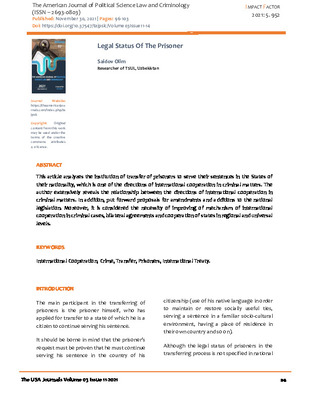Legal Status Of The Prisoner
Abstract
This article analyzes the institution of transfer of prisoners to serve their sentences in the States of their nationality, which is one of the directions of international cooperation in criminal matters. The author extensively reveals the relationship between the directions of international cooperation in criminal matters. In addition, put forward proposals for amendments and additions to the national legislation. Moreover, it is considered the necessity of improving of mechanism of international cooperation in criminal cases, bilateral agreements and cooperation of states in regional and universal levels.

Downloads
Researcher

Keywords:
Abstract
This article analyzes the institution of transfer of prisoners to serve their sentences in the States of their nationality, which is one of the directions of international cooperation in criminal matters. The author extensively reveals the relationship between the directions of international cooperation in criminal matters. In addition, put forward proposals for amendments and additions to the national legislation. Moreover, it is considered the necessity of improving of mechanism of international cooperation in criminal cases, bilateral agreements and cooperation of states in regional and universal levels.
References
Model agreement on the traser of foreign prisoners. Basic principles. Paragraph 6. [e-source]: www.un.org
Krymov A.A. Criminal procedure activities of bodies and institutions of the penitentiary system of Russia. DSc dissertation on jurid. sciences. – Moscow, 2015.
Seliverstova Y.A. Legal illiteracy of prisoners sentenced to imprisonment as one of the problems in the exercise of their right to appeal // Criminal executive policy, legislation and law: current state and development prospects: collection of articles. Materials of the round table / ed. by Seliverstov V.I, Utkin V.A. – Мoscow, 2014.
Standard Minimum Rules for the Treatment of Prisoners. 35 paragraphs. [e-sourse]: https://www.un.org/ru/documents/decl_conv/conventions/prison.shtml
Internationale Rechtshilfe in Strafsachen // URL: https:// www.bundesjustizamt.de/DE/Themen/Gerich-e_Behoerden/IRS/Rechtshilfe_node.html (Dated: 07.09. 2021)
Internationale Rechtshilfe in Strafsachen // URL: https:// www.bundesjustizamt.de/DE/Themen/Geriche_Behoerden/IRS/Rechtshilfe_node.html (Date of access: 07.09. 2021)
Umarkhanova D. The legal regulation issues of transferring and acceptance of persons with mental disorders for compulsory treatment in the state of their citizenship. Asian Journal of Research № 2 (7-12), 2018 IMPACT FACTOR SJIF 5,1 IFS 2,7 www.journalofresearch.asia . - P. 70-78.
Blinov A.V. Realization of the inalienable rights of the individual in places of deprivation of liberty: textbook. – Vologda, 2008.; Umarkhanova D. Some issues of international cooperation in criminal cases. European Journal of Academic Essays 4(3), 2017 ISSN (online): 2183-1904 ISSN (print): 2183-3818 www.euroessays.org. – P. 72-74.
Model agreement on the transfer of foreign prisoners. Appendix II. Paragraph 4. [e-source]: www.un.org
Code of Criminal Procedure of the Federal Republic of Germany - Strafprozessordnung (StPO) – as amended by Act of 14.09.2021.
Golovnenkov P., Spitsa N. The Code of Criminal Procedure of the Federal Republic of Germany – Strafprozessordnung (StPO). – Scientific and practical commentary and translation of the text of the law. Introduction to Criminal Procedure Law of the Federal Republic of Germany. – Мoscow: MGLA, 2012.
Umakhanova D. Features of video conferencing as forms of mutual legal assistance in criminal matters. Society and innovationsJournal home page: https://inscience.uz/index.php/socinov/index Issue -1, №02 (2020) / ISSN 2181-1415. - P. 292-299
Seventh United Nations Congress on the Prevention of Crime and the Treatment of Offenders, held in Milan from 26 August to 6 September 1985. Development and application of UN standards and norms in criminal justice. Note by the Secretariat.
Convention on the Transfer of Sentenced to Deprivation of Liberty for Further Serving of Sentence http://cis.minsk.by/reestr/ru/index.html#reestr/view/text?doc=776. -p.16.
Standard Minimum Rules for the Treatment of Prisoners. Paragraph 44. [e-source]: https://www.un.org/ru/documents/decl_conv/conventions/prison.shtml
European Treaties database [Electronic resource]: http://www.coe.int/
Resolution of the Cabinet of Ministers of the Republic of Uzbekistan No. 346 (17.10.2016) on the organization of transferring and reception by the Republic of Uzbekistan for compulsory treatment of persons with mental disorders. Collection of legislation of the Republic of Uzbekistan, 2016 y., № 42, article 485.





